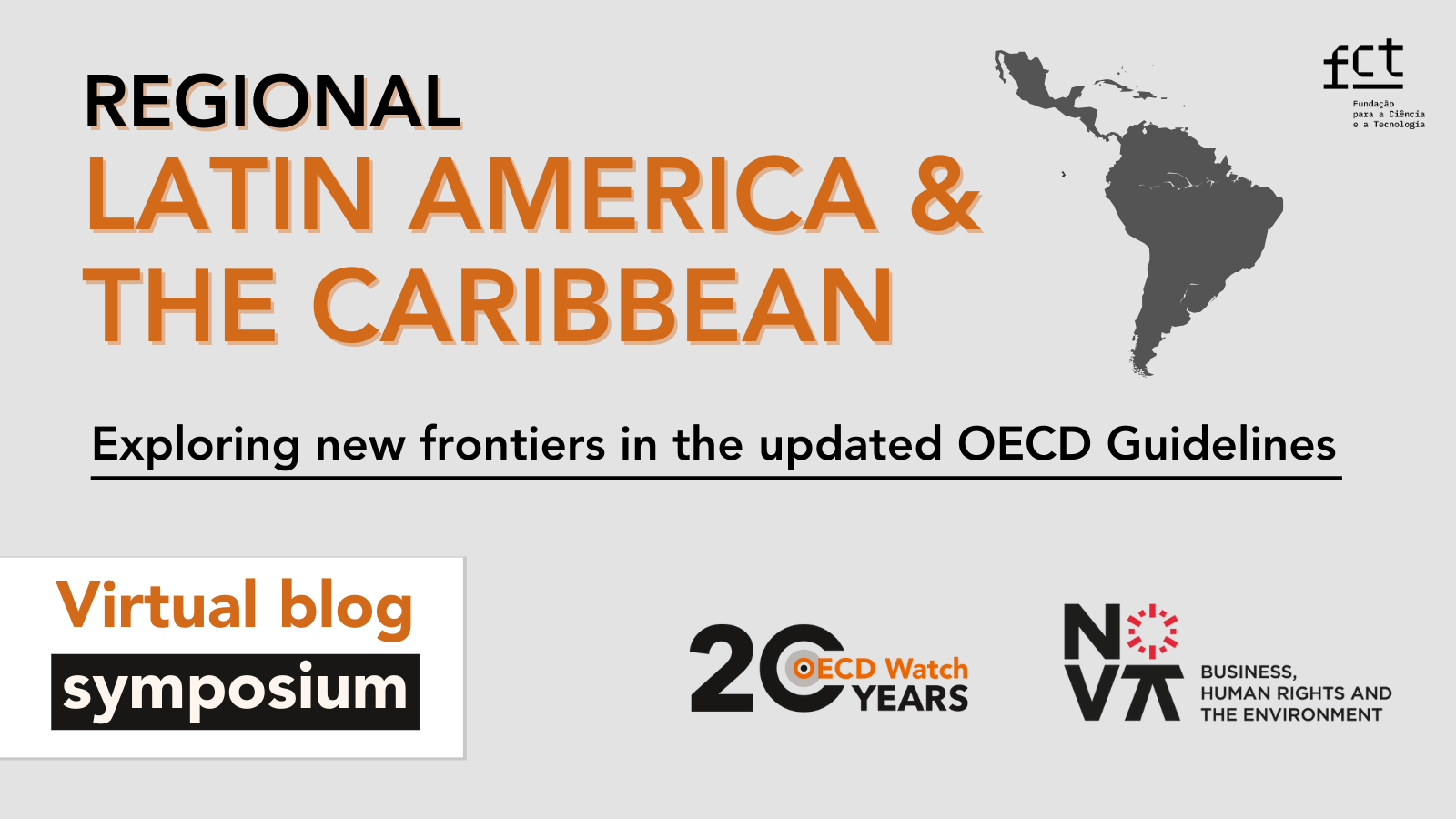The OECD Guidelines for Multinationals and the Escazú Agreement: enhancing protection to human rights defenders
About the author: Danielle Anne Pamplona is Full Professor at the Graduate Program of the Law School at Pontifícia Universidade Católica do Paraná – PUCPR; Head of the Human Rights Clinic at PUCPR; Co-President of the Global Business and Human Rights Scholars Association.
This blog symposium is co-organised by OECD Watch and NOVA School of Law.
The OECD Guidelines for Multinationals have just been revised and the new text has been received with curiosity and expectation. Curiosity in view of the possibilities that the text presents to promote advancements around protection of rights; and expectation in view of the potential impact of guidelines that aim to raise the standard of businesses’ conduct.
Twelve years on from the last revision of the text, the deepening of some challenges, changes in society and accumulated knowledge about ways of dealing with the difficulties faced by people and businesses have led to an urgent need for some changes. Based on a stocktaking exercise, the new features of this version are promising: it now addresses the fight against climate change and creates expectations that technology companies will also adopt due diligence processes, among other changes. From the point of view of those living in Latin America, there are two topics that have been included in the guidelines that are extremely relevant to the region: the recommendations for the protection of human rights defenders and for improving the transparency of responsible behaviour adopted by companies.
Considering the situation in Latin America, this contribution aims to point out relevant additions to the text of the Updated Guidelines (2023 OECD Guidelines) about the protection of human rights defenders and about disclosure, and how they relate to the regional agreement that tackles this very same issue, mentioned below. Latin America is the most dangerous region in the world for human rights defenders (including environmental defenders), accounting for 42% of cases worldwide. In 2021, there were 157 killings of environmental defenders in the region, out of a total of 200 worldwide. Brazil, Colombia and Mexico lead the table, with 113 deaths. The sectors most involved in these cases of violence are mining, extractivism and agriculture and for this reason, during the United Nations Conference on Sustainable Development (Rio+20), held in 2012 in Brazil, countries of the region committed themselves to building an international treaty that would promote the rights of access to information, participation and justice in environmental matters, with the aim of guaranteeing greater transparency of environmental information, access to justice mechanisms, greater social participation in the construction of policies and protection for environmental defenders. This is the history of the Regional Agreement on Access to Information, Public Participation and Justice in Environmental Matters in Latin America and the Caribbean, better known as the Escazú Agreement, adopted on 4 March 2018, so far signed by 25 and ratified by 15 States. The Agreement proposes a new development model by, among other things, including ‘those that have traditionally been underrepresented, excluded or marginalized and give a voice to the voiceless, leaving no one behind’. This contribution aims to call attention to the similitudes between the two documents, claiming that they are well harmonized. All information relates to provisions that were included on the OECD Guidelines in its updated version.
In response to the danger that the region represents to human rights and environmental defenders, and recognizing the special vulnerable situation of human rights defenders, the Escazú Agreement establishes that States must ensure a safe and enabling environment where these individuals can operate free from threats, restrictions and insecurity. This follows States duty to protect rights. In the case of human rights defenders, they are being chased and threatened also by non-State actors, and the State’s duty to protect human rights means it must adopt any measures adequate to prevent other people from harming rights. It is a direct command for States to regulate non-State agents’ conducts. The 2023 OECD Guidelines likewise recognizes, on Chapter IV, that States have the duty to protect human rights. And it also adds that businesses can have an impact on virtually the entire spectrum of internationally recognised human rights and, depending on circumstances, they need to consider additional standards as, for instance, the ones applicable to human rights defenders at heightened risk due to marginalisation, vulnerability or other circumstances. Both texts, therefore, reinforce State’s duty to protect human rights defenders.
The Escazú Agreement also provides that States will take appropriate and effective measures to recognise, protect and promote all rights of human rights defenders in environmental matters, including their right to life, personal integrity, freedom of opinion and expression, right to peaceful assembly and association and right to freedom of movement, among others. The 2023 OECD Guidelines is in line with the recognition that all rights might be adversely affected by businesses activities, in a true example of conversion of regulation.
In the same way, as the Escazú Agreement provides that States must take appropriate and effective measures to protect and promote human rights defenders’ ability to exercise access rights, the 2023 OECD Guidelines addresses this issue on chapter IV.6. Commentary 51 of this article establishes that when businesses provide for operational-level grievance mechanisms, they will not be used to preclude access to judicial or other non-judicial grievance mechanisms, in other words, the 2023 OECD Guidelines offer a concrete example of what conduct must not be taken by businesses, otherwise the ability to human rights defenders to access the right to justice would be impaired. It does feels, though, like such a provision could be inserted in the list of expected conducts from enterprises in the 2023 OECD Guideline, to make it more robust and to reinforce the behaviour expected of them. On Chapter IV.45 there is extensive language indicating that enterprises should respect the human rights of individuals belonging to specific groups or populations that require particular attention, where they may have adverse human rights impacts on them. It indicates that indigenous people and human rights defenders could be among these individuals and in order to clarify rights to be protected, the text mentions the UN Declaration on the Rights of Indigenous Peoples but does not mention the UN Declaration on Human Rights Defenders. This is a missed opportunity to encompass the specific rights that human rights defenders are entitled to. The mention to the UN Declaration of Human Rights Defenders would be relevant as the 2023 OECD Guidelines does not provide for a rights-language, instead, it does provide for the duties of corporations. The commentary (IV.45) that clarifies what conducts must not be taken by corporations would be more robust if it would refer to the corresponding rights at the UN Declaration on Human Rights Defenders.
Besides that, the General Policies (II.A.9) of the 2023 OECD Guidelines condemn corporate acts of reprisals against any persons or groups that may seek to or do investigate or raise concerns regarding actual or potential adverse impacts associated with the enterprise’s operations, products or services. The text will be strengthened if it would expressly mention human rights defenders.
There is one provision in the Escazú Agreement that seems to not resonate with the same strength with the OECD Guidelines. Under the Escazú Agreement States need to take appropriate, effective and timely measures to prevent, investigate and punish attacks, threats or intimidation that environmental human rights defenders may suffer in the exercise of their rights. Such a strong language is not used in the OECD Guidelines. Still, Chapter IV.1 says that businesses should avoid infringing on human rights of others and address their adverse human rights impacts and this can be interpreted as the same protection provided by the Escazú Agreement.
The Agreement proposes that when implementing its provisions, each State should be guided also by the principle of transparency. In addition to appearing as a principle, transparency is mentioned in the Agreement to establish that a transparent procedure guarantees the right of access to justice and that an independent oversight mechanism should be put in place by States to promote transparency in access to environmental information. The fact that these are the only mentions to transparency should not obscure how relevant the principle is for the Agreement. In fact, as the Escazú Agreement does promote the rights of human rights defenders, it also shows concern with the feasibility of their work. As much of the information needed to adequately guarantee rights is in the hands of businesses, it is paramount to provide for their responsibility to hand relevant information, qualified by requirements that allow for any stakeholder to fully understand the information handed. It means that the Agreement is very much concerned with access to environmental information and the principle of maximum disclosure guides public access to it (art.5.1). Transparency is also tackled when the Agreement provides for the facilitation of access for groups in vulnerable situations (art.5.3). These provisions meet the first concern of the 2023 OECD Guidelines: that the disclosure policies need to consider the views and informational requirements of relevant stakeholders (III.1). Regarding the substance of the information, the Escazú Agreement states that competent authorities must generate, publicize and disseminate environmental information relevant to their functions, meaning that the information needs to be pertinent to the context of the organism delivering it (art.6.1). Likewise, the 2023 OECD Guidelines mention that disclosure policies must include sustainability-related information (III.2.b). The 2023 OECD Guidelines also reinforce the Escazú Agreement when it declares that businesses need to provide relevant stakeholders with adequate, measurable, verifiable (where applicable) and timely information on environmental impacts associated with their operations, products and services (VI.I.d) matching the Agreement provision that information must be disclosed by in a systematic, proactive, timely, regular, accessible and comprehensible manner (art.6.1).
The approximation of the two texts seems to be completed with the language, in the Agreement, that States need to ‘take the necessary measures, through legal or administrative frameworks, among others, to promote access to environmental information in the possession of private entities, in particular information on their operations and the possible risks and effects on human health and the environment’ (art.6.12). It does relate to the concern raised in the 2023 OECD Guidelines regarding environmental information that must be disclosed by businesses.
Within the possibilities that a text like the one produced by the OECD presents, it seems clear that the update concerning mentions of environmental defenders and transparency in the publication of information should be welcomed. The 2023 OECD Guidelines and the Escazú Agreement have similar and complementary provisions that are very relevant to strengthening the rights of human rights defenders and to facilitate their activist work. It is hoped that these texts can be combined to demand the rights they protect, representing progress that can be measured beyond the language they use, and that represent real and tangible positive impacts.
Suggested citation: D. A. Pamplona, ‘The OECD Guidelines for Multinationals and the Escazú Agreement: enhancing protection to human rights defenders’, Nova Centre on Business, Human Rights and the Environment Blog, 26th October 2023


